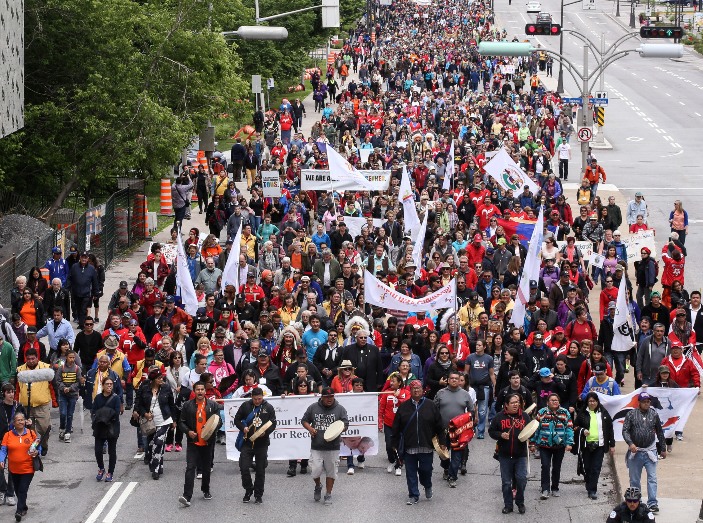
March for Reconciliation. Photo: Ben Powless.
![]() In 2007 the Truth and Reconciliation Commission of Canada (TRC) was established “to learn the truth about what happened in the residential schools and to inform all Canadians about what happened in the schools.”
In 2007 the Truth and Reconciliation Commission of Canada (TRC) was established “to learn the truth about what happened in the residential schools and to inform all Canadians about what happened in the schools.”
In 2015 the Truth and Reconciliation Commission released its Final Report and 94 Calls to Action. TRC Chief Commissioner Murray Sinclair said, “We have described for you a mountain, we have shown you the path to the top. We call upon you to do the climbing.”
Reconciliation queries
Quakers have a tradition of using queries to provoke spiritual reflection. Queries are simple questions used to stay grounded and to gain deeper insights. They promote work on oneself and can help a person to keep expressing their positive values during their day to day life.
Any non-Indigenous person, whether Quaker or not, may find these queries helpful in prompting reflection on their knowledge and actions for reconciliation. Download the reconciliation queries (PDF).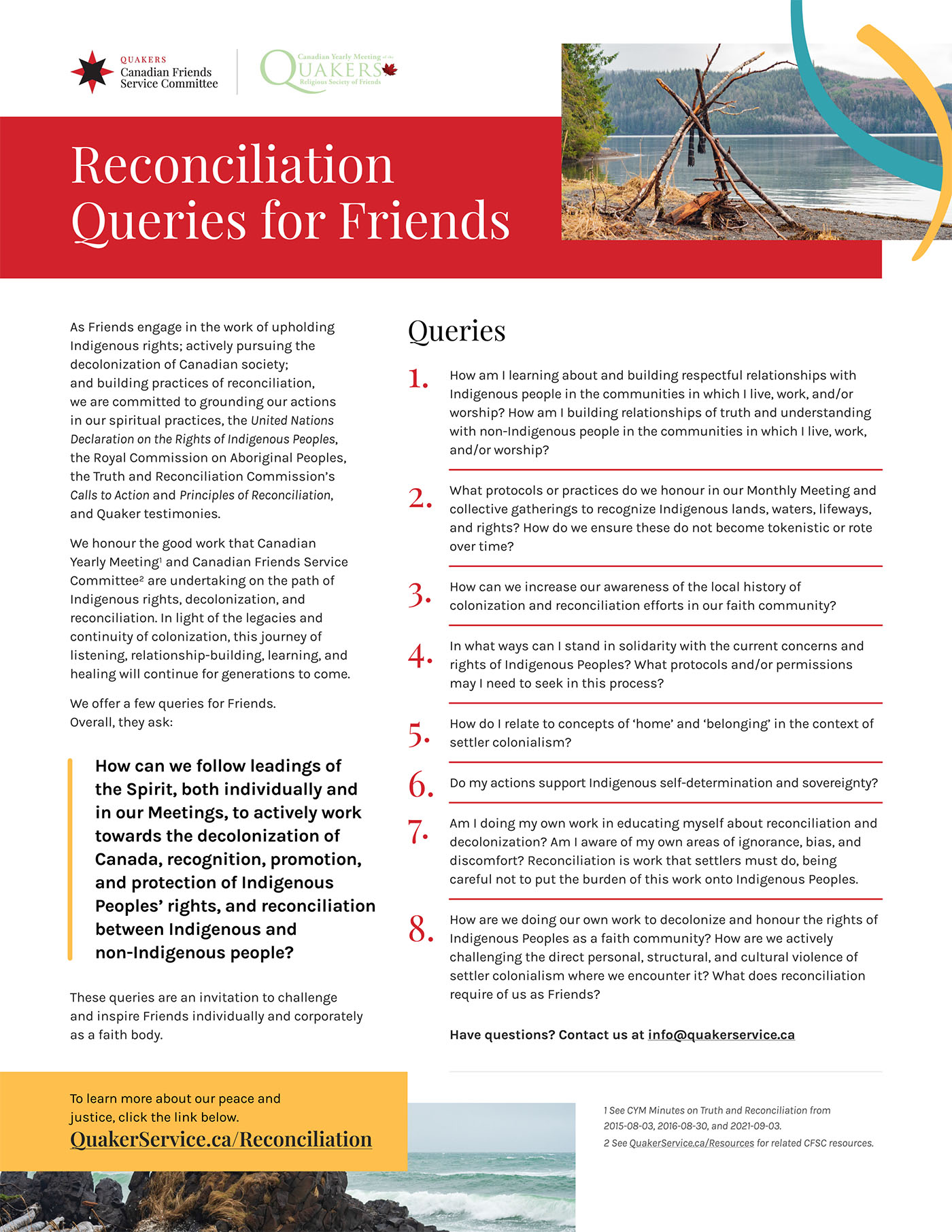
Indigenous voices on reconciliation
What does reconciliation mean to you? What suggestions do you have for non-Indigenous people to respectfully engage in reconciliation? Have you seen a change in how people are engaging in reconciliation in recent years?
Many settlers wish they could ask questions like these to Indigenous people without appearing foolish or rude. Canadian Friends Service Committee knows that not every settler has the opportunity to have open dialogue with Indigenous friends and neighbours. This is why we want to give you a chance to hear the answers to these and other questions directly from our Indigenous partners, people that we work closely with and trust to give us honest responses, and who trust us enough to engage with this project!
Watch the rest of the videos from this series to see how some of our Indigenous friends and partners responded to these questions.
Reconciliation Fund
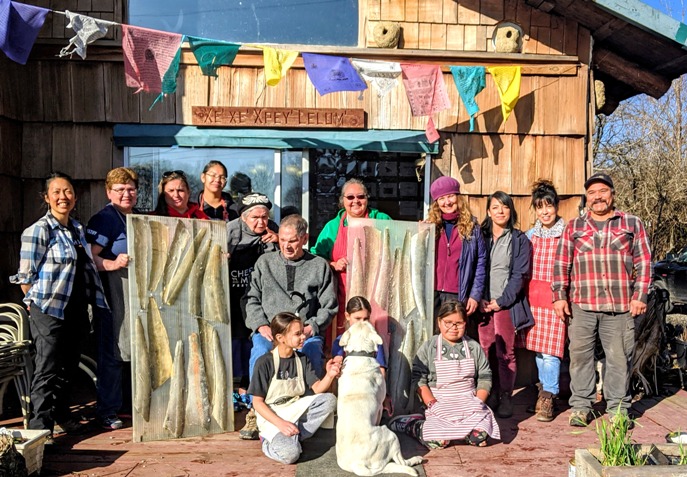
A 2019 Reconciliation Fund grant to Cowichan elder, teacher, and knowledge keeper Philomena Williams brought fish leather expert Janey Chan to teach the Georgetown Hul’q’umi’num’ (Coast Salish language) class the ancient practice of making leather from fish skins.
“I support the Reconciliation Fund out of a sense of responsibility, accountability, and obligation.”
—Tony McQuail, CFSC Reconciliation Fund donor
The CFSC Reconciliation Fund was established in 2017 in response to an individual Friend’s leading to contribute to reconciliation by donating a portion of his annual income to reconciliation initiatives. The purpose of the Fund is to support the grassroots, community-based efforts of Indigenous people in Canada who are working on cultural and language revitalization and other projects.
You can donate to the fund (choose Reconciliation Fund when giving) however and whenever you’re led: in the form of one-time donations, a monthly contribution, or as a percentage of your annual income as Tony does (read his description of why).
Grant decision-making and governance
The Reconciliation Fund is assisted by a Grant Advisory Committee, which advises on CFSC’s decisions on grant applications. The Grant Advisory committee is made up of Indigenous individuals with whom CFSC has existing partner relationships.
Past recipients
Tseshaht Re-awakening of ƛuukwatquuʔis (2022)
Tseshaht First Nation, supported in part by the Reconciliation Fund, held a ceremony to reawaken the place called ƛuukʷatquuʔis. They explain, “The cultural significance of this site has brought people together historically and continues to be a place of gathering and sharing to this day… We welcomed the broader community to celebrate with us and embrace the connections forged in honouring our history and sharing our culture. We reawakened ƛuukʷatquuʔis, unveiled the Wolf Tower and shared our truth in a historic day for not only Tseshaht but all people who joined us in our territory.”
Iakwahwatsiratatie Language Nest (2021)
The goal of the Iakwahwatsiratatie Language Nest is to create a language learning environment where parent will develop an understanding of how the Kanien'keha language works and build confidence to use Kanien'keha on a daily basis as well as teach it to their children. Funding from the Reconciliation Fund will be used to produce a family oriented Kanien'keha song book entitled, Tsi Non Kanatiio:ke.
Kanehsatà:ke video project (2020)
A video project marking the 30th Anniversary of the 1990 Kanehsatà:ke Siege, also known as the 1990 Oka Crisis. The project is a documentary that will be comprised of a commentary-style format inclusive of interviews with elders and art work. It will attempt to demonstrate the links between climate change and the importance of Indigenous Peoples’ traditional knowledge, showing the inextricable link of the land and Indigenous Peoples.
Georgetown Hul’q’umi’num’ (Coast Salish language) class (2019)
This CFSC Reconciliation Fund grant went towards bringing Janey Chang from Vancouver to teach the class the lost art of making leather from fish skins. Janey has put in a lot of effort researching and bringing back this skill. This is especially appropriate to Cowichan since salmon are the mainstay of the culture.
Haida Youth at the UN Permanent Forum on Indigenous Issues (2019)
An Indigenous teenager from Haida Gwaii, Haana Edenshaw, received a grant from the Reconciliation Fund to attend the UN Permanent Forum on Indigenous Issues in New York in order to learn and participate in the international mechanism. She joined CFSC’s delegation and made a number of speeches and presentations. See Haana’s speech made entirely in her Haida language.
Smoke Signals (2019)
This grant was to help fund the purchase of new equipment for the educational Indigenous radio show, Smoke Signals hosted by Dan and Mary Lou Smoke.
Kontinonhstats—Mohawk Language Custodians Association (MLCA) (2018)
This grant went towards research and curriculum development for Kanien'kéha language classes and cultural content.
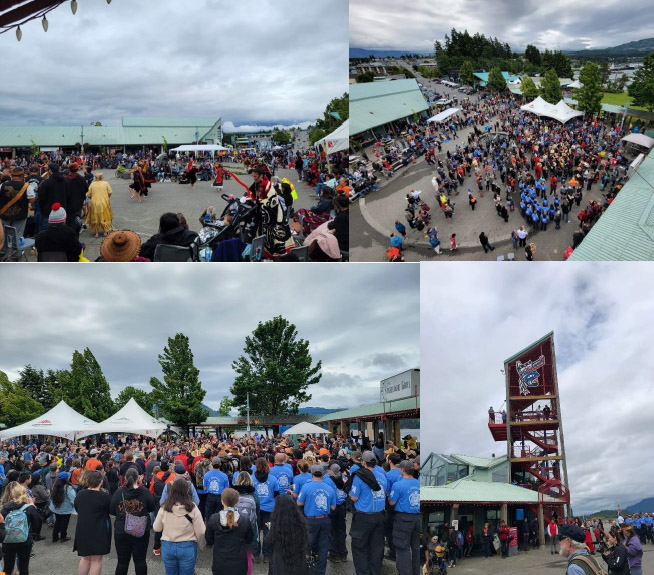
Photos of the Tseshaht Re-awakening of ƛuukwatquuʔis, 2022
Canadian Quaker involvement with the TRC
In 2011, Canadian Yearly Meeting, the national body of Canadian Quakers, called on Quakers to actively engage in reconciliation efforts:
“We are being invited by the Indigenous Peoples of Canada as represented by the Indian Residential School Survivors, through the Indian Residential School Survivors Settlement Agreement, to enter a journey of truth finding and reconciliation. We encourage all Friends, in their Meetings for Worship and Monthly and Regional Meetings, boldly to accept this invitation and to engage locally, regionally, and nationally, actively seeking ways to open ourselves to this process…”
Following the release of the TRC's Final Report and Calls to Action, Friends expressed our continued commitment to learning and to engaging in the hard work of reconciliation, stating, “We appreciate reconciliation is an ongoing process and not a one-time event. As Friends, we are committed to walk this journey.”
We also noted that in our reconciliation efforts:
“All actions require the guidance of the Indigenous Peoples involved and need to be done with respect, cooperation, and ongoing consultation.... We acknowledge that part of our journey is to decolonize our own thinking and sit in the discomfort and pain of confronting where we need to deepen our understanding, bear witness, and transform our behaviour.”
We encourage all Canadians to read the Calls to Action and discern what you might do to engage in reconciliation and building right relations with Indigenous Peoples.
CFSC was honoured to witness and participate in the closing events of the Truth and Reconciliation Commission of Canada and to be invited to facilitate a panel on the UN Declaration on the Rights of Indigenous Peoples.
Learn more about reconciliation and how to engage
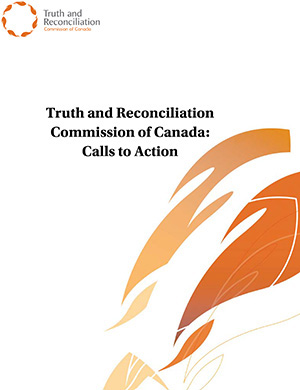
Contact us to purchase pocket-sized copies of the TRC Calls to Action.
Letters sent by Canadian Friends regarding the discovery of graves of Indigenous children at the sites of former residential schools.
Truth and Reconciliation: Quakers in Action—a resource to help Friends across Canada engage with the Calls to Action issued by the Truth and Reconciliation Commission. (2018)
Truth and Reconciliation: A Guide for Canadian Quakers. (2015)
Queries for Friends as we engage with reconciliation. (2015)
Brief about the TRC. (2015)
2022 Report on Quakers’ work for reconciliation.
2020 Report on Quakers’ work for reconciliation.
2019 Report on Quakers’ work for reconciliation.
2018 Report on Quakers’ work for reconciliation.
2017 Report on Quakers’ work for reconciliation.
Additional CFSC resources on Indigenous Peoples’ human rights.

